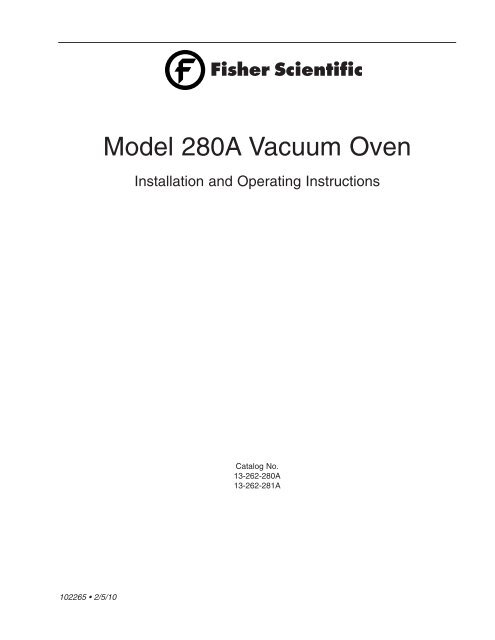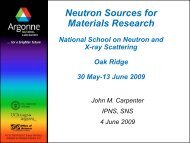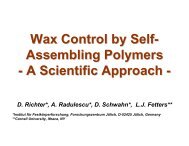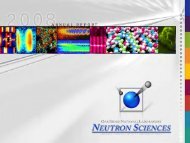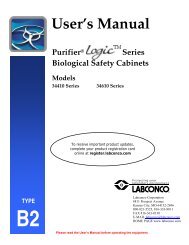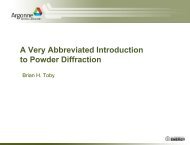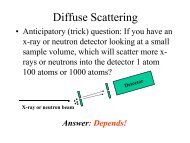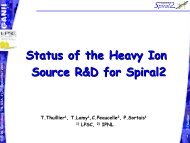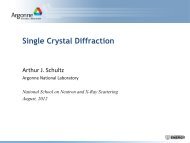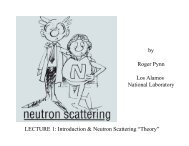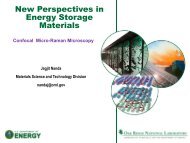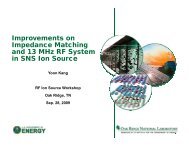Model 280A Vacuum Oven - Spallation Neutron Source
Model 280A Vacuum Oven - Spallation Neutron Source
Model 280A Vacuum Oven - Spallation Neutron Source
Create successful ePaper yourself
Turn your PDF publications into a flip-book with our unique Google optimized e-Paper software.
102265 • 2/5/10<br />
<strong>Model</strong> <strong>280A</strong> <strong>Vacuum</strong> <strong>Oven</strong><br />
Installation and Operating Instructions<br />
Catalog No.<br />
13-262-<strong>280A</strong><br />
13-262-281A
Table of Contents<br />
Performance and Physical Data..........................................................................................................................3<br />
Controls and Indicators ......................................................................................................................................4<br />
Operation ............................................................................................................................................................5<br />
Packing Checklist ........................................................................................................................................5<br />
Temperature Adjustment ..............................................................................................................................6<br />
Operation in a Static Environment................................................................................................................6<br />
Operation in a Controlled Environment ........................................................................................................6<br />
Operation in a <strong>Vacuum</strong> Environment............................................................................................................7<br />
<strong>Vacuum</strong> Sealing Agents................................................................................................................................7<br />
Out Gassing..................................................................................................................................................7<br />
Safety Precautions........................................................................................................................................8<br />
Maintenance and Servicing ................................................................................................................................9<br />
Cleaning Suggestions ..................................................................................................................................9<br />
Periodic Maintenance ..................................................................................................................................9<br />
Gasket Replacement..............................................................................................................................9<br />
Accessories and Replacement Parts ................................................................................................................10<br />
Accessories ................................................................................................................................................10<br />
Replacement Parts ....................................................................................................................................10<br />
Schematics ........................................................................................................................................................11<br />
Warranty ............................................................................................................................................................12<br />
2
Performance and Physical Data<br />
<strong>Model</strong> No. <strong>280A</strong><br />
Catalog No. 13-262-<strong>280A</strong> (120V), 13-262-281A (240V)<br />
<strong>Vacuum</strong> Range Atmosphere to 30" Hg.* with adequate pump<br />
<strong>Vacuum</strong> Leak Rate < .2” Hg per 24 hours<br />
Temperature Range Ambient to 200°C<br />
Shelf Capacity 2.0 ft 2<br />
Inside Dimensions 11.125”D x 9.75”W x 9.75”H<br />
Outside Dimensions 16”D x 15”W x 20”H<br />
Standard Electrical Service 1000 Watts, 120 VAC<br />
50/60 Hz. 8.4 Amps<br />
Optional:<br />
1000 Watts, 240 VAC,<br />
50/60 Hz , 4.2 Amps<br />
Net Weight (Pounds) 65 lb.<br />
*Within 10 Microns<br />
3
Controls and Indicators<br />
4<br />
1. Power Switch: Applies power to the oven temperature<br />
control.<br />
2. Temperature Control: Regulates the oven operating<br />
temperature.<br />
3. Heating Indicator: Indicates when the oven is<br />
being heated.<br />
4. Thermometer: 0° - 200°C dial thermometer with<br />
2° divisions.<br />
5. <strong>Vacuum</strong> Gauge: Indicates chamber vacuum in<br />
inches of mercury.<br />
6. Control Valves: Used for evacuating chamber,<br />
controlling vacuum, or for bleeding air and other<br />
gasses into chamber.
Note<br />
Recommended vacuum tubing and<br />
vacuum pumps are listed under the<br />
Accessory Items section of this manual.<br />
Operation<br />
1. Refer to the packing checklist for the list of<br />
accessories sent with this unit. Make certain<br />
you have all accessories before destroying the<br />
shipping container and packing material. Also<br />
verify that all-packing material and tape has<br />
been removed from inside the oven before operating.<br />
Packing Checklist<br />
Qty Description<br />
1 <strong>Model</strong> <strong>280A</strong> <strong>Vacuum</strong> <strong>Oven</strong><br />
1 Instruction Manual (PN 102265)<br />
1 <strong>Vacuum</strong> Grease Tube<br />
2 Shelf Trays<br />
1 Warranty Card<br />
2. Place the oven on a bench or stand at a convenient<br />
working height. Maintain a minimum of<br />
12 inches of clearance between the oven and<br />
any combustible surfaces.<br />
3. Turn temperature control to low position and<br />
turn power switch off.<br />
4. Check voltage and watts stamped on the data<br />
plate for compatibility before connecting oven to<br />
power source. The data plate can be found<br />
near the power cord.<br />
5. Connect a vacuum pumping system, including a<br />
suitable trap, to the serrated fitting on the valve<br />
designated as vacuum. Use 1/4” ID heavy<br />
walled tubing and secure the connection with a<br />
hose clamp.<br />
6. If desired, connect a purge gas supply to the<br />
remaining serrated fitting. Use a two-stage gas<br />
flow regulator if gas is to be supplied by a pressurized<br />
cylinder.<br />
5
OPERATION<br />
6<br />
Note<br />
When the oven is new and is first<br />
heated, the insulation will become<br />
scorched and some smoke and<br />
burning odor will occur. It is normal<br />
for this condition to last 2 to 3 hours<br />
at high heat.<br />
Temperature Adjustment<br />
1. Turn the power switch on to supply power to the<br />
oven.<br />
2. Turn the Temp. Control knob fully clockwise.<br />
The "Heating" indicator will glow when the unit is<br />
heating. When the temperature reaches the<br />
desired operating level (as indicated on the thermometer)<br />
turn the Temp. Control knob counterclockwise<br />
until the "Heating" indicator turns off.<br />
Allow the temperature to cycle on and off several<br />
times (3 to 4 hours) to make sure the oven<br />
has stabilized. Adjust the Temp. Control knob<br />
up or down as necessary.<br />
3. When temperature is at the desired setting proceed<br />
to operate in any one of the following vacuum<br />
environments<br />
Operation in a Static<br />
Environment<br />
Static environment refers to operation at atmospheric<br />
pressure and with air, as it is present. In this case the<br />
operator would simply place the sample in the oven<br />
chamber and set the desired temperature.<br />
Operation in a Controlled<br />
Environment<br />
Controlled environment refers to operation with the samples<br />
in an inert gas. To accomplish this, perform the following:<br />
1. Place samples in the oven chamber then close<br />
the oven door.<br />
2. Close the purge control valve.<br />
3. Open the vacuum control valve then turn on the<br />
vacuum pumping system to remove any air<br />
remaining in the oven.
4. Close the vacuum control valve and open the<br />
purge control valve to bleed in an inert gas.<br />
5. Close the purge control valve.<br />
OPERATION<br />
Operation in a <strong>Vacuum</strong><br />
Environment<br />
To operate in a vacuum environment, perform the following:<br />
1. Place samples in the oven then close the oven<br />
door.<br />
2. Close both the purge control and vacuum control<br />
valves<br />
3. Turn on the vacuum pumping system then open<br />
the vacuum control valve (fully counterclockwise)<br />
4. The vacuum, in inches of mercury, can be<br />
obtained from the vacuum gauge on the top of<br />
the oven.<br />
<strong>Vacuum</strong> Sealing Agents<br />
• High temperature vacuum grease is often necessary<br />
to provide a proper seal at tubing connections,<br />
valve connections, door seals, etc.<br />
This is especially important at high vacuums.<br />
Using silicone vacuum grease will damage the<br />
door seal and has restrictions for some types of<br />
materials placed in the oven.<br />
Out Gassing<br />
• The operation of the oven at high temperature<br />
while evacuating the chamber will help drive off<br />
absorbed gasses on the walls and three surfaces<br />
and facilitate attainment of high vacuums.<br />
7
OPERATION<br />
8<br />
Safety Precautions<br />
• Before operation, always observe the following<br />
Safety precautions. This unit is not explosion<br />
proof. Do not use in the presence of flammable<br />
or combustible materials; fire or explosion may<br />
result. Unit contains components that may ignite<br />
such materials. Do not place volatile items in the<br />
chamber. Fumes and spillage from acidic solutions<br />
cause corrosion of the stainless steel<br />
chamber. Care should be taken to maintain neutral<br />
pH at all times.<br />
• Do not operate oven at temperatures above<br />
200° C.<br />
• Do not permit materials of any kind to rest on<br />
top of unit when operating at elevated temperatures.<br />
• Do not touch the oven door particularly the glass<br />
portion, with unprotected hands when operating<br />
at elevated temperatures.<br />
• To prevent overheating unit is equipped with a<br />
safety thermostat that will open at approximately<br />
230°C.<br />
• The oven is equipped with silicone door gaskets.<br />
Do not use silicone door gaskets or vacuum<br />
grease when evaporating solvents in the<br />
oven or when using high aniline point oils.<br />
BUNA-N gaskets should be used in applications<br />
when evaporating solvents or when using high<br />
aniline point oils. The interior finish or silicone<br />
gaskets may be damaged by the following:<br />
• BUNA-N gaskets should not be used above 125°C.<br />
Diesel oil JP-4 oil<br />
MIL-0-5606 Hydraulic Fluids<br />
Butyl Acetate Carbon Tetrachloride<br />
Ethylene Chloride Gasoline<br />
Kerosene Zylene<br />
Methyl Chloride Stoddard Solvent<br />
Toluene Aromatic Chlorinated Solvent
Maintenance and Servicing<br />
Cleaning Suggestions<br />
• Use the mildest cleaning procedure that will do<br />
the job effectively.<br />
• Rinse thoroughly with water after every cleaning<br />
operation.<br />
• Wipe dry to avoid watermarks.<br />
• A stainless steel wool pad, sponge or fibrous<br />
brush is recommended. Avoid use of ordinary<br />
steel wool or steel brushes for scouring stainless<br />
steel.<br />
Periodic Maintenance<br />
• Secured access panels, covers, etc., should<br />
never be removed from this equipment by anyone<br />
other then experienced service personnel,<br />
• If the oven fails to maintain set temperature, it<br />
may indicate a problem with the Temp. Control,<br />
or possibly a heating element failure. Contact<br />
your local Fisher Scientific service representative<br />
(1-800-395-5442).<br />
• Gaskets should be checked periodically for<br />
hardening, shrinking, deterioration or other signs<br />
of wear. It is advisable to keep several gaskets<br />
available for use as replacements.<br />
Seal Replacement<br />
To replace the oven seal, remove the old seal and<br />
perform the following:<br />
1. Clean edge of chamber with Xylene, (Cat. No.<br />
LLX5-500).<br />
2. Apply a thin bead of Dow Corning RTV-736 red<br />
silicone rubber adhesive to edge of the chamber.<br />
Place gasket on chamber and close the<br />
door.<br />
3. Keep door closed for a minimum of 16 hours<br />
with 1 to 2 inches of vacuum before using.<br />
9
Accessories and Replacement Parts<br />
10<br />
Accessory Items<br />
Detailed information on accessory items is located in the<br />
Fisher Scientific catalog.<br />
Item No. Description<br />
01-257-2C <strong>Vacuum</strong> Pump<br />
01-257-4A <strong>Vacuum</strong> Pump Oil<br />
01-257-12 Clear <strong>Vacuum</strong> Tubing<br />
14-635-5D <strong>Vacuum</strong> Grease<br />
Replacement Parts<br />
Part No. Description<br />
SPN83373 Power Switch<br />
SPN102219 Temp. Control (Thermostat)<br />
SPN20845 Temp. Control Knob<br />
SPN102222 Thermal Cut-Out<br />
SPN98991 Pilot Light<br />
SPN102256 Thermometer<br />
SPN98998 Rubber Feet<br />
SPN102161 Control Valve<br />
SPN102220 <strong>Vacuum</strong> Gauge<br />
SPN30790 Heating Element (120V)<br />
SPN50430 Door Gasket - Silicone<br />
SPN50430B Door Gasket - BUNA-N<br />
SPN50430V Door Gasket - Viton<br />
SPN02336 Window<br />
When ordering replacement parts, please specify the<br />
model number and serial number of your unit, and date<br />
the unit was purchased. The model and serial numbers<br />
can be found on the nameplate, which is located near the<br />
service cord.
Schematics<br />
11
Warranty<br />
Laboratory instruments and equipment manufactured by Fisher Scientific Company L.L.C. – Laboratory<br />
Equipment Division (hereinafter called “the Company”) are warranted only as stated below.<br />
Subject to the exceptions and upon the conditions specified below, the Company agrees, at its election, to<br />
correct by repair, by replacement, or by credit to the purchaser, any defect of materials or workmanship which<br />
develops within one year (13 months for refrigerator and freezer products) from the date of purchase by the<br />
original purchaser by the Company or by an authorized dealer of the Company provided that investigation or<br />
factory inspection by the Company discloses that such defect developed under normal and proper use<br />
The exceptions and conditions mentioned above are the following:<br />
a. The Company makes no warranty concerning components or accessories not manufactured by it,<br />
such as tubes, batteries, etc. However, in the event of the failure of any component or accessory not<br />
manufactured by the Company, the Company will give reasonable assistance to the purchaser in<br />
obtaining from the respective manufacturer whatever adjustment is reasonable in the light of the<br />
manufacturer’s own warranty.<br />
b. The Company shall be released from all obligations under its warranty in the event repairs or<br />
modifications are made by persons other than its own service personnel or authorized dealer<br />
personnel unless such repairs by others are made with the written consent of the Company.<br />
c. THE COMPANY MAKES NO WARRANTY OF MERCHANTABILITY, FITNESS FOR ANY<br />
PARTICULAR PURPOSE, OR ANY OTHER WARRANTY, EXPRESS OR IMPLIED, EITHER IN<br />
FACT OF BY OPERATION OF LAW,…STATUTORY OR OTHERWISE.<br />
d. The above warranty and the above obligations to repair, replace, or credit are complete and<br />
exclusive and the Company expressly disclaims liability for lost profits or for special, indirect,<br />
incidental, consequential, or exemplary damages of any nature whether attributable to contract,<br />
warranty, negligence, strict liability, or otherwise even if the Company has been advised of the<br />
possibility of such damages.<br />
e. Representations and warranties made by any person, including dealers and representatives of the<br />
Company, which are inconsistent or in conflict with the foregoing warranty shall not be binding upon<br />
the Company unless reduced to writing and signed by an officer of the Company.


